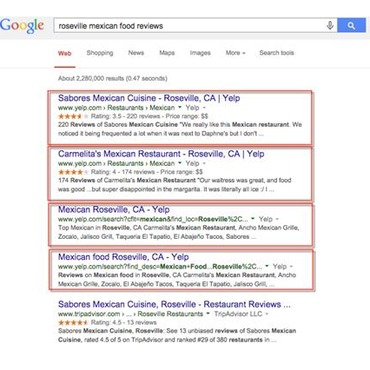Does Yelp Really Matter?
In a search marketing world that is dictated by Google, should businesses care about getting Yelp reviews?
In a search marketing world that is dictated by Google, should businesses care about getting Yelp reviews?
 Although Yelp reviews do not always show up above Google’s own search results, they are visible in many local intent queries, and have an impact on rankings.
Although Yelp reviews do not always show up above Google’s own search results, they are visible in many local intent queries, and have an impact on rankings.
From an SEO perspective, Google now takes into account a business’ presence on Yelp, such as the number of reviews it has and how positive they are, according to Tod Hirsch, marketing strategist at Blast Analytics and Marketing.
Previously, Google manipulated its algorithm to show its own local listings and content above Yelp pages, even if a query included the word “Yelp.” But in July of last year, the search giant introduced “Pigeon,” an updated algorithm that altered local results and changed the way that Google interpreted location tools. Benefiting from this major update, Yelp reviews started showing up higher on search engine result pages (SERPs).
“Pigeon has allowed Yelp to regain its visibility and has boosted its appearance back into local search results, especially comparison and review-oriented queries,” says Hirsch.
For example, should a searcher type “roseville mexican food reviews” (please note the word “review”) into Google, all the top search results come from Yelp, as shown in the image below:

Image Credit: Blast Analytics and Marketing
It seems clear that having a presence on Yelp via reviews certainly gives local businesses higher rankings than they may otherwise have had. But there are other ways to gain visibility, too, according to Josh Patterson, SEO manager at digital marketing agency Jellyfish, adding that branded search using specific keywords pertaining to a company can play a big role.
“With the launch of Hummingbird and the implementation of Knowledge Graph, we now see an assortment of information in the right-hand side bar of Google search results related to the brand itself. While this particular element may not impact search from a ranking perspective, it can help to increase overall brand interaction and engagement,” says Patterson.
Other factors that come into play include using Google+ Local. The most significant part of that sentence is the word “Google.” While Google controls search results, visibility is at the mercy of its algorithms. And even though Pigeon has helped to deliver more localized results such as those on Yelp, Google is integrated everywhere. This means that even though Yelp reviews may show up in the first or second spot of the SERPs, more likely than not there will also be a great big box to the right hand side – the Knowledge Graph – that will be displaying Google owned reviews or information.
Verifiability should also be taken into account. According to Hirsch, Google attempts to verify businesses through consistency of their name, address, and phone number – also known as NAP – across the major local directories such as Google My Business, Facebook, Foursquare, and Yelp, so it is always important to make sure that the correct details are listed. This helps a business show up in Google Maps, which once again, often ranks higher than Yelp results.
Google certainly seems to be giving Yelp a run for its money but Jellyfish’s Patterson believes that the review company will continue to hold its place in search marketing for a while longer, especially as the shift from desktop search to mobile continues to grow.
“More and more people are turning to mobile search and apps than have ever done before. As long as businesses do their due diligence making sure all listings and local citations are up to date, and continue to encourage customers to review their business on Yelp, there is dual benefit. It will help in terms of ranking and relevance from a search engine perspective and it will also improve visibility on mobile app search,” Patterson concludes.
Homepage image via Shutterstock.